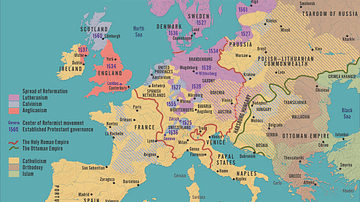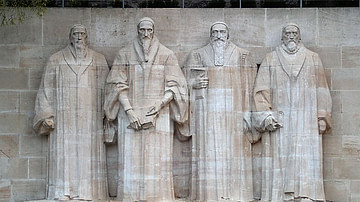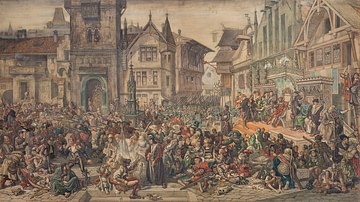Balthasar Hubmaier (l. 1480-1528) was a Catholic theologian who converted to the Protestant Anabaptist sect in 1525. His Concerning Heretics and Those Who Burn Them (1524) was a plea for religious tolerance written prior to his conversion to a sect persecuted by both Catholics and Protestants who dismissed the piece as heretical.
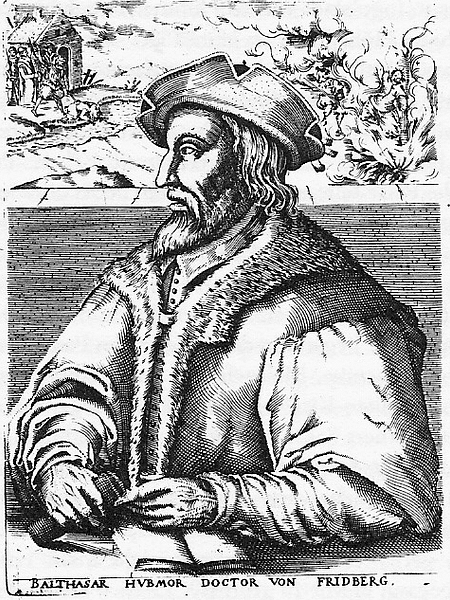
Although Hubmaier wrote the work as a Catholic, it was adopted by the Anabaptists to denounce the practice of both Catholic and Protestant tribunals of charging the unorthodox with heresy and sentencing them to death. The Church had been executing 'heretics' for centuries by this time and, once the Protestant sects established themselves, they retained this practice. Although Catholics and Protestants could not seem to agree on anything else, they found common ground in persecuting the 'other', and their common enemy after 1525 became the Anabaptist sect, which rejected the tenets of both and, except for some radical leaders, advocated pacifism.
Once Hubmaier became an Anabaptist, his work – like that of all Anabaptists – was condemned as heretical even though he regularly cites the Bible throughout in support of his claims. His central argument is simply that the practice of burning people alive as heretics is unbiblical as it contradicts the words and example of Jesus Christ and so is actually evil and the work of Satan. Hubmaier's piece was widely circulated after publication as he had been a popular Catholic preacher, but after his conversion, he fell out of favor except among Anabaptists. Hubmaier and his wife, Elizabeth (née Hügline) would eventually be executed for heresy in 1528, but his works were preserved by the Anabaptists, who continue to flourish under various names in the present day.
Early Life & Reformation
Little is known of Hubmaier's early life except that he was born in Bavaria in 1480, attended Latin School at Augsburg, and was a student at the University of Freiburg by 1503. In 1512, he was awarded his doctorate by the University of Ingolstadt and accepted the post of vice-rector in 1515. His scholarship and talent as a preacher attracted the attention of the congregation at Regensburg, and he moved there as the parish priest in 1516.
In 1519, in response to mounting tension between the Christians and Jews of Regensburg, Hubmaier organized the pogrom that drove the Jewish community from the city, destroyed their cemetery and synagogue, and confiscated their property. Tombs and gravestones from the cemetery, along with the ruins of the synagogue, were broken up and used as building material for a chapel built on the synagogue's old site. It does not seem that this pogrom had anything to do with Hubmaier's later conversion, but it is possible the violence visited on the Jewish community inclined him toward the pacifism of the Anabaptist movement.
By the time of the pogrom, the works of Martin Luther (l. 1483-1546) were in circulation and Huldrych Zwingli (l. 1484-1531) was preaching reform in Zürich. Martin Luther's 95 Theses began what would become the Protestant Reformation in 1517, but Hubmaier does not seem to have responded to this challenge to the Church's authority until 1522 when he met the humanist scholar and theologian Desiderius Erasmus (l. 1466-1536) at Basel. Erasmus had advocated for reforms in the Church before Luther began his crusade but never broke from it. Something in that meeting, most likely Erasmus' humanist philosophy and loyalty to the Church, encouraged Hubmaier to seek out Zwingli in Zürich for disputation in 1523, and there he met the young men who were to establish the Anabaptist movement.
Anabaptists & Hubmaier's Conversion
Conrad Grebel (l. c. 1498-1526) and Felix Manz (l. c. 1498-1527) had been followers of Zwingli until they broke with him after the Second Disputation of 1523 (during which he defended his beliefs) when they felt he had compromised on important issues to please the city council. They were later joined by George Blaurock (l. c. 1491-1529), a former priest, who had also become disillusioned by Zwingli's apparent compromises. These three formed the Swiss Brethren which understood the Bible as the literal word of God and objected to the practice of the Catholic Church and the emerging Protestant sects led by Luther and Zwingli of only arguing for what fitted their interpretation of Christianity in scripture and ignoring what did not suit them.
Among their central issues were infant baptism, the Catholic Mass, tithes, and Christians serving in the military. None of these, they claimed, was supported by the Bible, and neither was the practice of burning people alive for their religious beliefs. They took special issue with infant baptism because, to them, the Bible was clear that only an adult had the power to choose to be baptized and the tradition of infant baptism was an invention of the Church which accomplished nothing. Christians, they claimed, were not behaving according to the model of Christ or his disciples and the reformed version of Christianity was no better than the old faith that had been rejected.

In January of 1525, Blaurock, Grebel, Manz, Wilhelm Reublin (l. 1484 to c. 1559), and others, baptized each other into their new faith, and, according to Blaurock's Origin of the Anabaptists, Hubmaier joined them afterwards, having been baptized by Reublin. By this time, he had already married Elizabeth (1524), embraced the reformed vision of Christianity, and abandoned it for Anabaptism. That the pacifism of the Anabaptists appealed to him is no surprise as his Concerning Heretics and Those Who Burn Them reads like an Anabaptist tract on non-violence. The Anabaptists quite quickly adopted pacifism as a central tenet of their faith in accordance with the biblical commandment "Thou Shalt Not Kill", and as the movement developed, this would become a defining characteristic of the faith.
It is unclear if there was a single event that inspired Hubmaier's conversion to the Anabaptist movement, but it seems to have been encouraged by his 1523 disputation with Zwingli during which he – like Grebel and the others – recognized that Zwingli's Reformed vision, which he claimed to have based entirely on scripture, supported unbiblical tenets including infant baptism and the use of violence in both conversion and the suppression of heresy. Scholar Brad S. Gregory observes how the Anabaptists rejected the existing Christian belief systems because, as they saw it, neither Catholic nor Protestant adhered to the model of Christ and early Christianity:
True Christians had always been persecuted, not persecutors [as Anabaptist writer Hans de Ries writes] "there is no surer indication of the false Church that fights against Christ than the killing of heretics, or rather alleged heretics, because as terrible as heresy is, this is the most terrible of all." (319)
Hubmaier's Concerning Heretics and Those Who Burn Them predates de Ries' work Martyr's Mirror (1631-1632) by over 100 years and, in all that time, had as little effect on stopping religious executions as when it was published in 1524. There is no evidence that Hubmaier's work had any effect on Catholic persecution of Protestants, Protestant attacks on Catholics, or Protestants killing Protestants over doctrinal disputes at any time. Still, he may have hoped that people would take more notice of the message and spare him and his fellow Swiss Brethren. Their insistence on and practice of adult baptism, pacifism, and refusal to pay tithes, however, led to their condemnation by both Catholics and Protestants who derisively labeled them Anabaptists (rebaptizers) and began persecuting them in Zürich, with Zwingli's encouragement, by 1526.
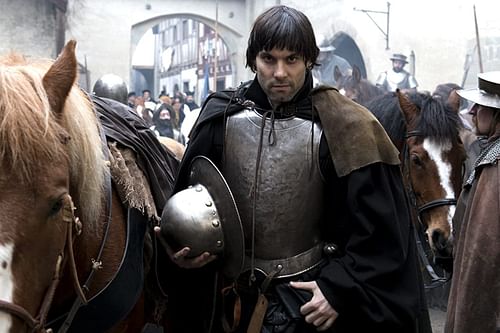
The Text
Concerning Heretics and Those Who Burn Them consists of 36 concise points with biblical citations as support. As with all of Hubmaier's works, it ends with his personal motto, "Truth is Immortal", and he seems to have regarded his argument as largely self-evident. By stating his points as succinctly as possible, and providing biblical support for them, he seems to have believed they would be well-received and easily implemented. This turned out not to be the case, especially for the Anabaptists, including Hubmaier and his wife.
Hubmaier blames the poor example set by Catholic clergy for encouraging what they then condemned as 'heresy' and focuses on Christ's parable of the wheat and the tares in arguing for tolerance and restraint. Only God can judge anyone, Hubmaier argues, and it is God's place, not man's, to punish justly for sin. Rather than execute those with different ideas, he says, one should try to convince them of their error or just leave them alone.
The following passage is taken from A Reformation Reader: Primary Texts with Introductions, edited by Denis R. Janz, pp. 202-203, originally reprinted as translated in Balthasar Hubmaier: The Leader of the Anabaptists by Henry C. Vedder, AMS Press, 1971:
1. Heretics are those who wickedly oppose the Holy Scriptures, the first of whom was the devil when he said to Eve, "Ye shall not surely die" (Genesis 3:4) together with his followers.
2. Those also are heretics who cast a veil over the scriptures and interpret them otherwise than the Holy Spirit demands; as those who everywhere proclaim a concubine as a benefice, pastoring and ruling the church at Rome, and compelling us to believe this talk.
3. Those who are such one should overcome with holy knowledge, not angrily but softly, although the Holy Scriptures contain wrath.
4. But this wrath of the Scriptures is truly a spiritual fire and zeal of love, not burning without the Word of God.
5. If they will not be taught by strong proofs or evangelic reasons, then let them be, and leave them to rage and be mad (Titus 3:2, 3), that those who are filthy may become more filthy still (Revelation 22:11)
6. The law that condemns heretics to the fire builds up both Zion in blood and Jerusalem in wickedness.
7. Therefore, will they be taken away in sighs, for the judgments of God (whose right it is to judge) either convert or harden them, that the blind lead the blind and both the seduced and the seducer go from bad to worse.
8. This is the will of Christ who said, "Let both grow together till the harvest, lest while ye gather up the tares ye root up also the wheat with them" (Matthew 13:29). "For there must also be heresies among you, that they that are approved may be made manifest among you" (I Corinthians 11:19).
9. Though they indeed experience this, yet they are not put away until Christ shall say to the reapers, "Gather first the tares and bind them in bundles to burn them" (Matthew 13:30).
10. This word does not teach us idleness but strife; for we should unceasingly contend, not with men but with their godless doctrine.
11. The unwatchful bishops are the cause of the heresies. "When men slept, the enemy came" (Matthew 13:25).
12. Again, "Blessed is the man who is a watcher at the door of the bridegroom’s chamber" (Proverbs 8:34) and neither sleeps nor "sits in the seat of the scornful" (Psalms 1:1).
13. Hence it follows that the Inquisitors are the greatest heretics of all, since, against the doctrine and example of Christ, they condemn heretics to fire, and before the time of harvest root up the wheat with the tares.
14. For Christ did not come to butcher, destroy, and burn, but that those that live might live more abundantly (John 10:10).
15. We should pray and hope for repentance, as long as man lives in this misery.
16. A Turk or a heretic is not convinced by our act, either with the sword or with fire, but only with patience and prayer; and so we should await with patience the judgment of God.
17. If we do otherwise, God will treat our sword as stubble, and burning fire as mockery (Job 41:29).
18. So unholy and far off from evangelical doctrine is the whole order of preaching friars that hitherto out of them alone the inquisitors have come.
19. If these only knew of what spirit they ought to be, they would not so shamelessly pervert God's Word, nor so often cry, "To the fire, to the fire!" (Luke 9:54-56).
20. It is no excuse (as they chatter) that they give over the wicked to the secular power, for he who thus gives over, sins more deeply (John 19:11).
21. For each Christian has a sword against the wicked, which is the Word of God (Ephesians 6:17) but not a sword against the malignant.
22. The secular power rightly and properly puts to death the criminals who injure the bodies of the defenseless (Romans 13:3,4). But he who is God's cannot injure anyone, unless he first deserts the gospel.
23. Christ has shown us this clearly, saying, "Fear not them that kill the body" (Matthew 10:28).
24. The secular power judges criminals, but not the godless who cannot injure either body or soul, but rather are a benefit; therefore God can in wisdom draw good from evil.
25. Faith which flows from the gospel fountain lives only in contests, and the rougher they become, so much the greater becomes faith.
26. That everyone has not been taught the gospel truth is due to the bishops no less than to the common people – these that they have not cared for a better shepherd, the former that they have nor performed their office properly.
27. If the blind lead the blind, according to the just judgment of God, they both fall together into the ditch (Matthew 15:14).
28. Hence, to burn heretics is in appearance to profess Christ (Titus 1:10, 11) but, in reality, to deny him and to be more monstrous than Jehoiakim, the King of Judah (Jeremiah 37:23).
29. If it is blasphemy to destroy a heretic, how much more is it to burn to ashes a faithful herald of the Word of God, unconvicted, not arraigned by the truth.
30. The greatest deception of the peoples is a zeal for God that is unscripturally expended, the salvation of the soul, honor of the church, love of truth, good intention, use of custom, episcopal decrees, the teaching of the reason that come by the natural light. For they are deadly arrows where they are not led and directed by the Scriptures.
31. We should not presume, led away by the deception of our own purpose, to do better or more securely than God has spoken by his own mouth.
32. Those who rely on their good intention and think to do better, are like Uzziah and Peter. The latter was called Satan by Christ (Matthew 16:23) but the former came to a wretched end (I Chronicles 13:10).
33. Elnathan, Delaiah, and Gemariah acted wisely in withstanding Jehoiakim, the King of Judah, when he cast the book of Jehovah into the fire (Jeremiah 36:25).
34. But in that, after one book was burnt, Baruch by the express direction of Jeremiah, wrote another much better (Jeremiah 36:27-32), we see the just punishment of God on the unrighteous burning. For so it shall be that on those who fear the frost, a cold snow falls (Job 6:16).
35. But we do not hold that it was unchristian to burn their numerous books of incantations, as the fact in the Acts of the Apostles shows (Acts 19:19). It is a small thing to burn innocent paper, but to point out an error and to disprove it by Scripture, that is art.
36. Now it is clear to everyone, even the blind, that a law to burn heretics is an invention of the devil. Truth is Immortal.
Conclusion
Unfortunately, Hubmaier's claim was not clear to everyone. In December 1525, Zwingli had Hubmaier arrested as a heretic for preaching against infant baptism and advocating for the Anabaptist vision of Christianity. Hubmaier was tortured until he recanted and was set free, afterwards retracting his recantation, and moving with his wife to Moravia in 1526.
Zwingli's persecution of the Anabaptists continued in Zürich throughout that year and into the next with the execution of Felix Manz in January 1527; the same day George Blaurock was beaten and exiled. Three more Anabaptists were drowned in Zürich before the rest moved elsewhere and Conrad Grebel, who had left the city in 1525, is thought to have died of the plague only because there is no record of his execution.
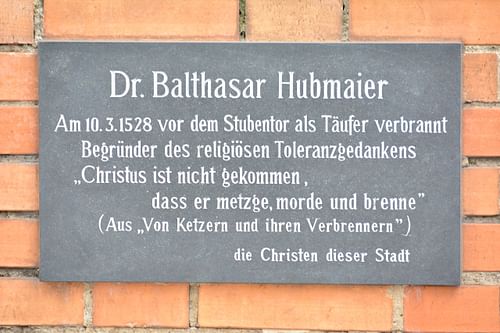
Hubmaier established himself in Nikolsburg, Moravia (modern-day Mikulov, Czech Republic) where he founded an Anabaptist community and made a number of converts before being arrested, along with Elizabeth, and charged with heresy. He was again tortured but would not recant and was burned at the stake on 10 March 1528. Three days later, Elizabeth Hubmaier was bound, weighted with a stone, and drowned by the same Christian authorities that had executed her husband and who, clearly, never had taken the message of his work to heart.
